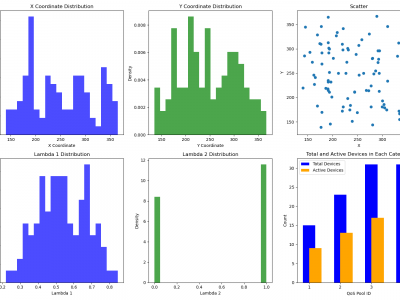Datasets
Standard Dataset
Statistical data for QoS-enabled IoT network with Poisson and Beta Distribution
- Citation Author(s):
- Submitted by:
- Dr. Farooque Kumbhar
- Last updated:
- Sun, 10/13/2024 - 03:58
- DOI:
- 10.21227/m6b4-jm14
- License:
 365 Views
365 Views- Categories:
- Keywords:
Abstract
This dataset comprises a range of features, including time slots, device IDs, geographic coordinates (x, y), energy consumption, uplink history, emergency status, QoS pool identifiers, data flags, resource IDs, and data sizes. The device locations are modeled using a Poisson distribution with a spread of \(100\) meters within a \(500 \times 500\) meter area. The uplink history, QoS pool assignments, and data flags are derived from the probabilities of data availability and priority values.
To construct two distinct datasets, we applied a beta distribution to model the probability of data availability and priority levels, allowing for variations in uplink traffic patterns. The normal traffic dataset exhibits a balanced and mixed access pattern, featuring equal representation of all four device types.
Our dataset is statistically reproducible and is available for access via the provided link. Together with our proposed system, these datasets serve as a robust benchmark for future research endeavors.
Configuration variables include the following. The variable :
maxWidth = 500
maxHeight = 500
spread_x = 100
spread_y = 100
alpha1 = 20
beta1 = 22
alpha2 = 10
beta2 = 10
lambda_2_thresh = 0.5
totalTimeSlots = 50
totalDevices = 100








